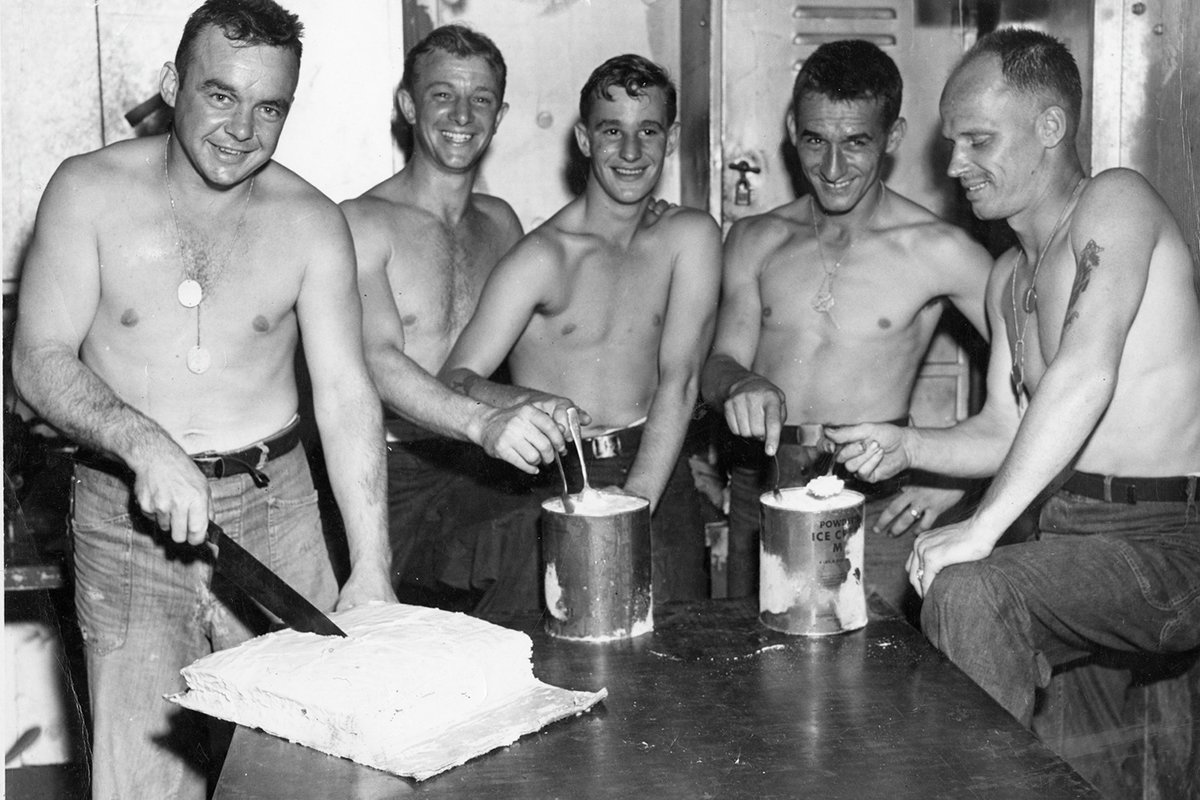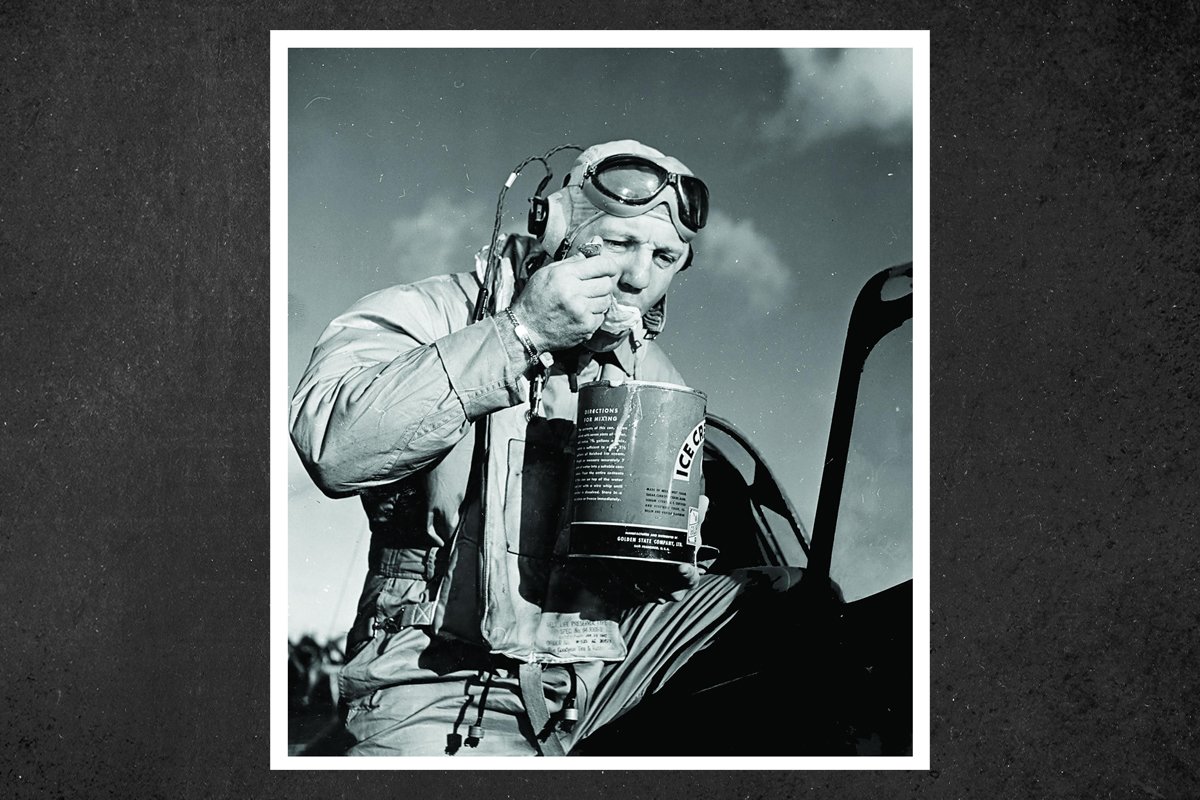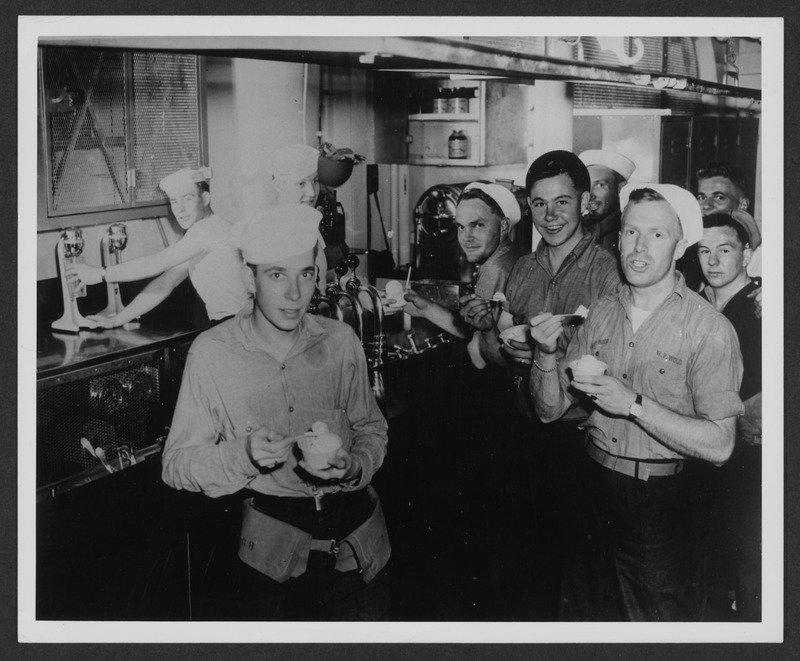More Whiskey and Beer, Less Ice Cream: Chesty Puller’s War Against ‘Sissy Food’

Sailors share cake and ice cream while on deployment. Photo courtesy of the US Naval Institute.
Lt. Gen. Lewis “Chesty” Puller had a problem with ice cream. The Marine Corps legend, who earned an unprecedented five Navy Cross medals throughout his 37-year career, argued that ice cream was a “sissy food” and proposed that whiskey and beer were better fuel for the American fighting spirit.
Puller’s hatred for America’s beloved frozen comfort food dated from World War I; his distaste ran so deep that the vaunted Marine lobbied the Pentagon during the Korean War years, seeking to exclude ice cream from the Marine Corps’ diet. However, Puller’s opposition created a national backlash that forced the Pentagon to mandate that ice cream be served no fewer than three times a week.
The entire affair showcased how the delicious dessert had become a prominent mainstay within the military.

Beginning in 1914, the US Navy banned all alcohol on ships. Sailors thereafter turned to ice cream as a tasty substitute and morale boost while at sea. When the 1920 Volstead Act prohibited the manufacture, transport, and sale of intoxicating liquors, ice cream remained a favorite among the troops.
The love affair between sailors and ice cream was proven in May 1942 after a Japanese torpedo struck the USS Lexington aircraft carrier. In the moments before the skipper gave the order to abandon ship, a warrant officer on the gun deck broke the lock on the freezer door and handed out containers of ice cream. Sailors leaped from their wounded vessel with their arms full of the frozen dessert.
J. Hunter Reinburg, a squadron commander, believed he could improve the morale of his Marine aviators flying in the Pacific in 1943. His plan was to transform their heavy bombers into makeshift ice cream machines. The idea was that the vibrations of the B-17 Flying Fortresses’ engines and machine guns would be enough to churn their ice cream cargo, and the cold temperatures of high-altitude flights would ensure it didn’t melt. These tests were informally called Operation Freeze flights.

The first Operation Freeze test resulted in a slurpy mess. On the second flight, crew members put the ice cream containers inside bolted ammo cans positioned under the removable maintenance panel on the wings. The mixture remained frozen but still wasn’t up to the aircrew’s standards.
On the third attempt, the aircrew upgraded the ammo cans with small propellers. The aircraft’s slipstream turned these propellers, which then moved a screw inside the can to mix the ice cream. The innovation was a resounding success.
If flying ice cream machines weren’t enough to please American World War II service members, the $1 million floating ice cream factory the Navy built in the final year of the war certainly sufficed. The ingenious idea involved the conversion of a concrete barge into a massive floating ice cream parlor that served warships. The barge could hold more than 2,000 gallons of ice cream and produced an average of 10 gallons every seven minutes. The only drawback was that the barge had to be pulled around by tugboats. Otherwise, it admirably served as a glorified, if stationary, party vessel.
The Army wasn’t immune to the ice cream mania, either, during World War II. Miniature ice cream factories sprouted up near the front lines, and ice cream cartons often reached the soldiers’ foxholes. The dedicated inclusion of ice cream throughout each service branch was the added morale boost our troops needed to get the job done.
Read Next:

Matt Fratus is a history staff writer for Coffee or Die. He prides himself on uncovering the most fascinating tales of history by sharing them through any means of engaging storytelling. He writes for his micro-blog @LateNightHistory on Instagram, where he shares the story behind the image. He is also the host of the Late Night History podcast. When not writing about history, Matt enjoys volunteering for One More Wave and rooting for Boston sports teams.
BRCC and Bad Moon Print Press team up for an exclusive, limited-edition T-shirt design!
BRCC partners with Team Room Design for an exclusive T-shirt release!
Thirty Seconds Out has partnered with BRCC for an exclusive shirt design invoking the God of Winter.
Lucas O'Hara of Grizzly Forge has teamed up with BRCC for a badass, exclusive Shirt Club T-shirt design featuring his most popular knife and tiomahawk.
Coffee or Die sits down with one of the graphic designers behind Black Rifle Coffee's signature look and vibe.
Biden will award the Medal of Honor to a Vietnam War Army helicopter pilot who risked his life to save a reconnaissance team from almost certain death.
Ever wonder how much Jack Mandaville would f*ck sh*t up if he went back in time? The American Revolution didn't even see him coming.
A nearly 200-year-old West Point time capsule that at first appeared to yield little more than dust contains hidden treasure, the US Military Academy said.












